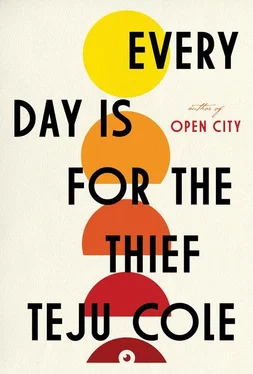In this journey of return, the greatest surprise is how inessential her memory is to me, how inessential I have made it, even in revisiting sites that we knew together, or in seeing many people who knew us both. People know better than to ask about her. This is what it is to be a stranger: when you leave, there is no void. Mother was a stranger here. She left no void after eighteen years, as if she had never been here. And I, fatherless, am also like a man without a mother, even if it is her face and her pale color that looks back at me from every photograph and reflective surface. I roam all over Lagos, and even once travel along the road that links Unilag with Yaba bus stop, but I cannot bring myself to revisit the site, along that road, of my father’s grave, at Atan Cemetery.
In December, dust drowns the city. But one Friday morning in the third week of the month, it rains heavily for only the second time in the dry season. It is a relief. It makes the roads torturous. Where there were shallow depressions, lakes suddenly appear. Rivulets rage along the roads. The rain falls for an intense half hour just after I head out. On Allen Avenue, through the gray scrim of the rolled-up windows, I see a swarm of lime-green shirts and yellow trousers, lime-green blouses and yellow skirts: students caught in the rain, racing for shelter. These teenagers, thrilled by the weather and by the excitement of running together, are laughing, but are inaudible through the heavy rain drumming on the car roof. I drive slowly through this dream of hurrying bodies.
The rain stops as suddenly as it started. The city is becalmed and devastated as it always is after a downpour. The streets are clear, the air renewed, and I only have to avoid some puddles as I turn off Ikorodu Road. I’m on my way to visit an old friend. I’ll call her Amina. She’s a woman now, the same age as I am, but when I last saw her, she was a girl and I was a boy, and we’d just come past the moment of first love. Our love, a matter of months, has remained with me all these years as one of my few sweet memories of the city. Recently, through email, we found each other again. We didn’t talk about the past, but now I am on my way to visit her.
Near Akoka, on a road I know well, a police officer flags me down. Lean, in a black uniform, with a hungry look, he walks toward the car. His gait is that of a much larger man, a capacious and considered saunter. His colleague, equally lean, doesn’t get up from their makeshift shelter, which is set back from the road: a bench, four wooden poles, a tin roof. It’s a sniper’s hideout.
— Good afternoon, Officer.
— You know why I stopped you?
His certainty alarms me. No, I say evenly, I don’t know.
— What does that sign say?
He points to a sign behind us. Its upright element is bent, and the sign itself is partially obscured by a tree.
— Oh God. I didn’t see it. This road never used to be a one-way. It must be a new sign.
It’s a scam, of course. The sign has been deliberately concealed.
— It’s one way from here to the end, until the entrance to the university.

— I didn’t know. Sorry. I didn’t know.
He chuckles. The moment has been well rehearsed.
— This is not a matter of sorry.
— I didn’t see the sign. I didn’t know.
— The sign is not for those who know, oga . The sign is for those who don’t know. Your situation is unfortunate. But the reason the sign is there is for you. You have to come to the station with us.
Minutes are wasted. I don’t want to let go of my entire afternoon only to later pay a “fine” that will end up in someone’s pocket. Finally, he comes around to his demand, or rather, he compels me to make it explicit.
— So, what are we to do now, Officer? Maybe one thousand five hundred, so you can get yourself something to eat?
His opening bid is five thousand naira. I manage to hide my disgust, and bargain him down to two thousand five. I hand the money over, start the car. You people should know the law, he says. It doesn’t matter who you are, the law is not a respecter of persons.
I keep my eyes on the road. My face floods with fury.
Amina has come out onto the street to meet me. She looks like herself: girlish still, slender, with chubby cheeks. She wears her hair in an afro usually, but today she’s plaited it simply. I catch sight of her wounded hand (a kitchen accident), which she makes no effort to conceal. Three fingers, two stumps. I back into the driveway of the two-story duplex. It’s a middle-class home, a ground-floor apartment of, I guess, two or three bedrooms, with exterior paint that has gone gray in parts. Air conditioners protrude from several windows and, from somewhere, comes the hum of a generator or two. In the doorway is a man whom I suppose is her husband. He carries a sleeping toddler.
— My husband, Henry. My daughter, Rekia. Please come in, come in.
We are playing grown-ups.
Amina’s living room has solid red floor-to-ceiling drapes and a hushed air. She looks less girlish now. The interior has brought a seriousness to her mood and her body. I notice the bags under her eyes, little dots of heat rash on her cheeks, and the nubs where her right middle and ring finger used to be. Daylight shoots through in a white column where the drapes fail to meet in the middle. Conversation is polite. Henry is a kind, narrow-shouldered man with the beginnings of a paunch. The flat-screen TV, which is on but muted, is playing a Nollywood drama.
He is a banker; he has Friday mornings off. Amina recently left banking and is looking for the next thing. She says she enjoys the opportunity to be with her daughter, but there’s something dutiful in the answer. I ask them about their commutes to work, and about whether they plan to have more children. They don’t ask me much about myself. They do ask if I’d like lunch, and I say no. She has, I presume, told him about me: the first heart she broke (or perhaps it was the other way around). It would be different if I was alone here with her, without the stranger who knows nothing of our conversations, our letters (belabored cursive on perfumed paper; where are they all now?), our long-ago truancy, our first frightened moments in bed, the shame and delight after. And then doing it again and again, any opportunity we had, swept up in a hunger like none since.
The pauses last too long. The tension is that of a waiting room, and I wonder why I have come, why I have chosen, yet again, to recover the impossible. I tell them about my encounter with the policeman, careful not to sound too angry about it.
— You see what we have to face in this country? she says, laughing. But you paid too much. One thousand naira would have done it.
I listen closely to her laughter. I can’t quite reconcile it with what I remember. I can’t tell if it has darkened or if it is some other difference. Is there some trace in her every reaction of that day her hand was caught in the food processor? There had been a power surge, a mutual friend had told me. Something had slipped, somehow, or she had reached into the machine. The blades had whirred, and she’d lost a lot of blood.
I’m distracted by this thought when Henry asks me something.
— Sorry?
— I said, Did you think you could move back here?
— Oh, who knows? The money would have to be right. Things would have to fall into place. It’s easier for bankers than for doctors. We have good banks and bad hospitals.
Another pause. Traffic outside. Generators. There are many lives and many years, and relatively few moments when those individual histories touch each other with real recognition.
Читать дальше













